Columbians Remember: 20 Years Since the September 11 Attacks
In commemoration of this somber date, Columbia News reached out to our community to learn what Columbians witnessed and recalled from September 11, 2001.
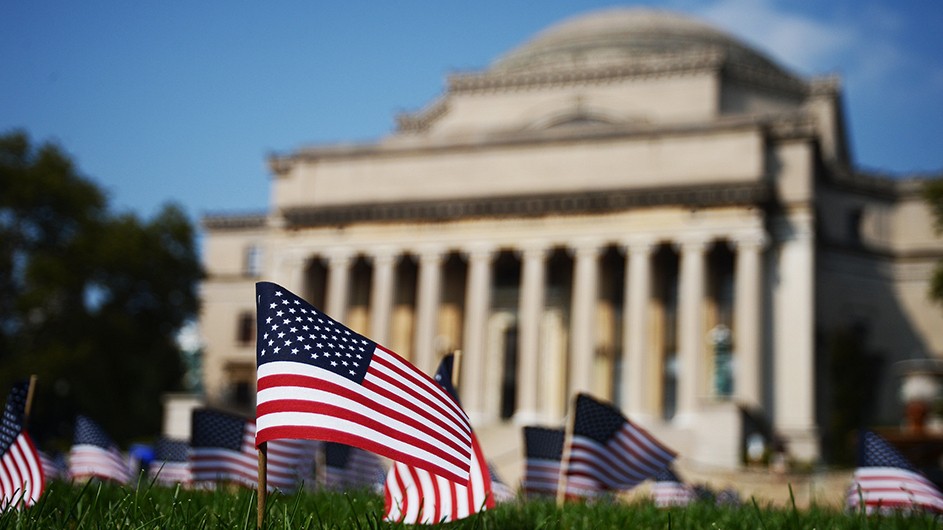
While it has been two decades since New York City and the world witnessed the horror of the terrorist attacks on the World Trade Center, the Pentagon, and Flight 93 in Somerset, Pennsylvania, the memories of those events remain at the forefront for many of us.
COLUMBIA REMEMBERS
Below, read poignant remembrances of that day and the emotions that followed from members of our Columbia community.
Editor's Note: These are recollections from a traumatic event two decades ago. There might be some factual discrepancies in the stories.
Sam Aldridge, CC'19
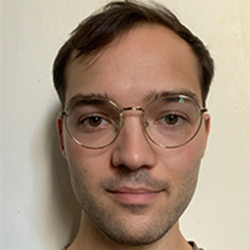
I was five years old and in my third day of kindergarten. Two weeks before, my family had taken me and my twin brother to the top of the Empire State Building where we marveled at the Twin Towers in the late afternoon glow.
In the classroom the news was playing on the television, teachers were frantic and crying, and as I looked on, my child's mind couldn't understand how planes vanished into flame.
James McShane, Vice President for Public Safety, Columbia University
I was an Inspector in the NYPD on 9/11. I worked in Manhattan and, as such, I was a first responder on that day. We arrived at the World Trade Center shortly after the second airplane struck the South Tower. As my driver and I approached along the West Side Highway, I could see debris falling from the towers as they burned in the distance. As we got closer, it became apparent that it wasn't debris that was falling but, rather, it was people who were jumping to their deaths to escape being burned alive.
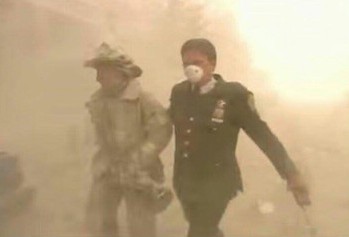
I was there when each of the towers fell. I was very fortunate in that I was able to survive both collapses. After the second tower collapsed, there was an eerie silence that pervaded the smoking ruins and the rest of lower Manhattan. Most of the afternoon was spent leading people to the Hudson River where a flotilla of ferries and other boats took them to safety.
At some point in the afternoon, we took a ride to St. Luke's Hospital to have our eyes examined and cleaned out. We were covered from head to toe with dust and soot. As we turned onto the block, I expected to see crowds of patients and doctors overflowing onto the sidewalk. Instead, the sidewalk was empty except for a few doctors and nurses who were sitting outside enjoying the brilliant September sunshine. Sadly, there were no patients to be treated. On 9/11, you either lived or you died horribly. There was no middle ground.
At the time, my daughter Caroline (CC'08) was a student at Loyola High School on East 83rd Street. As there was no public transportation available that day, she was walking home to Riverdale with a friend. She called me to see if I had survived the collapse and told me where she was. My driver and I immediately went across town to meet her and transport her to safety. When she saw me, she was shocked at all of the debris and dust that covered us and our car. She started to cry and we hugged. I took them home and went back to what soon became known as Ground Zero.
September 11, 2001, was the 30th birthday of one of my staff officers, Evelyn Urena. We had a cake for her back in the office that we never got to eat. As the sun was setting that day, we regrouped all of my officers on the West Side Highway and took a head count to be sure that we had everyone accounted for. It wasn't until the next day that I learned that one of my sergeants, Sgt. Timmy Roy, had been in court that day and had run to the towers to help out. He died in the line of duty when the towers collapsed. Ultimately, they found his remains on St. Patrick's Day, 2002. Not knowing this as the sun set on 9/11, we all sang ‘Happy Birthday' to Evelyn on the empty West Side highway. We all then went home to catch a few hours of sleep, only to return the next morning to continue the work of rescue and recovery.
We worked at Ground Zero almost every day for months. When I finally got a day off, I learned that Bill Meehan, my best friend since elementary school, who worked for Cantor Fitzgerald, had been killed on 9/11.
As for me, I have been pretty lucky in the aftermath of 9/11. While I have lost many friends and colleagues to 9/11 related illnesses, I am still pretty healthy. And while I am not much for public commemoration of what happened that day, every year, on 9/11, I go down to Ground Zero at night, when the crowds are gone, the sky is dark and the memorial twin beams of light are shining brightly in the night sky. I think of my buddy Billy, and all the other innocent victims of that day, and then I go on with my life.
Never forget!!
Christina M. Greer, GSAS’08
September 11, 2001, happened my first week of grad school in the political science department. I remember watching a plane hit the first tower and leaving to go attend my Statistics class with Bob Shapiro. I was so afraid of falling behind in class I refused to let my brain and my heart digest what I had just witnessed. I sat through the entire class (which was packed) and by the time we finished and walked into the halls of the SIPA building, the world had changed.
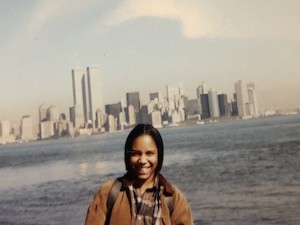
There was a quiet in the uptown part of the city. On the 15th floor people gathered to see the billowing smoke. I remember going home and calling my parents, filling the bathtub with water in case we lost power, and taking a long walk in Riverside Park heading south until I realized that was not the smartest idea.
I had been on an airplane just a few days prior visiting my grandparents in Florida, and my sister was now stuck in Florida and unable to fly back to Philadelphia for medical school. I remember trying to help her figure out how she would get back north via train or car. I remember thinking about an art project I had just conducted only three months prior in one of the towers—on one of the floors that was directly hit. I wondered if the artists I had met that one time were working that day. The rest of the day was a blur. I remember trying to find something to watch on television and just giving up and going to bed ... hoping the next day would not bring the same level of death, destruction, and uncertainty.
Stephanie Harrell, GS’04, GSAS’09
This is more a personal ad of sorts, but on 9/11, I was on the 6th floor of Butler Library. A blonde-haired, female, Business School student came up to me in a panic and asked me if I had paper. She said that she was planning to meet her husband at the library as they were planning to go to lunch together. She told me he was working in the World Trade Center. She was frantic, trying to find a way to leave him a note. I gave her a couple of sheets of notebook paper and either I left or she left. I can't be sure. I can't remember how I came to learn she was a student at the Business School either. It was all a rush of words. Sometimes I think it was a figment of my imagination, but I still can feel her panic. I think about that woman every 9/11 and would really like to know if she and her husband are okay.
Lucas Higuera-Hidalgo, Instructional Support Supervisor, School of Professional Studies
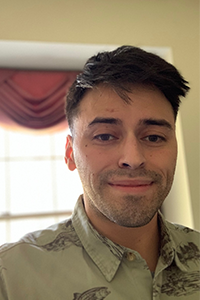
I recall being about eight or nine years old. During our grade school lesson, the teacher was interrupted by the acting principal. She suddenly had a very shocked demeanor and immediately halted whatever the class was doing. All the students were sent home early due to the fear-inducing element of the attack. All we knew at the moment was that NYC was being attacked. Later, I found out that my teacher's brother lost his life in the attack. It was very confusing for me at the time. I didn't fully comprehend it but I was also fearful for what I could understand.
My father worked in NYC and in the district by the Twin Towers. I felt my mother's anxieties as we didn't know the status of my father's whereabouts. Luckily, my father came home minutes after we turned on the television. He reluctantly didn't go into work that one day. It's amazing to think in retrospect. I'll never forget how both my parents were stuck to the television with the news on, especially during a time where that wasn't the norm. It was something that will never leave me.
As an immigrant, I will always recount feelings and memories, before 9/11 and after. The general public's attention and focus changed almost instantly. Things were different, and attitudes toward various immigrant communities definitely felt the backlash of this event. I can even recall my father bringing me into the city sometime after the whole collapse of the towers and just seeing so much broken glass everywhere. I recall blocks full of broken glass everywhere probably months after there was major clean-up. My life changed in many aspects, for better and for worse. I think it's safe to say that 9/11 still lives in the minds and hearts of many New Yorkers, Tri-State folks, and Americans alike.
Genise Reid, TC'90, TC'12
On the morning of September 11, 2001, I arrived early at Lerner Hall, my then-workspace as a financial aid officer for CC/FFSEAS. Shortly after 9 a.m., a colleague came to my office and said, "A plane just crashed into the World Trade Center." I replied, "That's the most ridiculous thing I've ever heard." A few minutes later I realized that it was too quiet ... my phone wasn't ringing; there were no students at the front desk. I looked down the hall: no one at the mailboxes. No one walking on the ramps, no one walking the stairs.
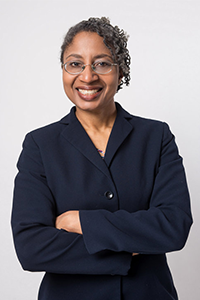
I walked down the ramp and looked around, then noticed a group of people clustered around a television screen. I joined the group, and a few minutes later saw the second plane crash. I went back to my office to call my husband who was at work in Connecticut, but my call attempts would not go through. After several tries with no success in reaching him, I thought I should instead go check on my 70-plus-year-old mother, who was a short subway ride away in the Bronx.
On learning that the subways were not in service, I decided I would walk the distance. I walked from Lerner Hall to 122nd Street and Broadway, and realized there was no way I would be able to safely complete the two-hour walk in my shoes. So I turned back around and walked down to the sneaker store on 110th Street. There were a couple dozen people already on line to purchase sneakers. The cash registers were offline, so the staff were using paper forms and old-school credit card imprinters to record purchases.
Thirty minutes into resuming my walk, with "cheap" sneakers on my feet and my wallet sixty dollars lighter, I learned from a police officer that the subways were back in service.
Mommy was fine. My husband was fine. I thought I was all right.
A couple of days later I was back in my office, and got a call from the front desk: a parent had come in, asking to speak with someone. I said yes, not realizing I was getting "the first one."
The parent sat on the other side of my desk, shared with me the student's name, and mentioned that the student's other parent had been missing for two days. As we continued talking, I glanced at a list I had found online earlier in the day. It was a list of businesses that had offices in the Twin Towers. I don't know what had prompted me to save the list. But I had it on my screen, positioned so that only I could see it. The business she spoke of had been on one of the upper floors. The missing parent had been at ground zero.
In that moment I was not thinking of my training in counseling, though I was grateful for its part in helping me to keep my composure. I was thinking to myself, "Our lives will never be the same. Will we be all right?"
Over the years I have heard many 9/11 stories, some from people I know personally. There is the one who was in Staten Island, running late, and by missing his usual ferry he avoided disaster. There is the one who led an entire work team out of one of the towers, from crisis to safety. There is the one who escaped with physical safety, but whose mind is consumed with looking backwards and pining over what might have been.
My own life was affected in small ways that I could not have anticipated. In 2013, for example, I declined a consulting opportunity because the office I would have been working in was on the 50th floor of a building in Lower Manhattan. Subconsciously then, but now known to me, I had actually spent well over a decade past 9/11 avoiding working in spaces higher than the sixth floor. Thankfully, as time has passed on, so have those feelings and fears.
Not as often nowadays, but sometimes, I think of that parent who had come into my office, and in remembering, I pause to pray for that family. And then I pray for myself. And as I type this, I pray for you who will someday read this—especially if you are still under stresses that were birthed in the 9/11 tragedy. I pray that you will experience the gentle erasing of symptoms, and that you will experience the sort of peace that replaces fear.
Our lives will never be the same. But we will be all right.
Lisa Anderson, Dean Emerita, School of International and Public Affairs
I was the dean of SIPA on 9/11. For the following issue of SIPANews, I wrote a "From the Dean" that I still think captures the moment as well as anything.
Irene Finel-Honigman, Adjunct Professor of International Affairs, School of International and Public Affairs
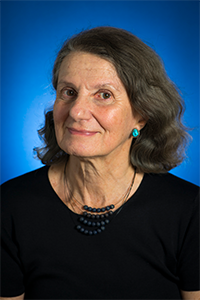
I began teaching at SIPA, at the Institute for the Study of Europe, exactly one week prior to 9/11: a large class enthused to learn about Europe, the European Union, and the new global currency, the Euro. The morning of the attack, I sat on my terrace, reviewing my notes when I suddenly saw a huge black cloud billowing over lower Manhattan.
Rushing inside, turning on the television, watching the second plane crash, and very quickly receiving news that the Pentagon had been struck, I remember the first reaction as concern for immediate family in New York and D.C., followed by shock, confusion, and outrage. Communications were limited to the telephone, basic email, radio, and news. Columbia sent out information, but the lines were quickly overloaded.
That night, New Yorkers poured out in the streets, all transportation shut down, many in lower Manhattan desperately trying to reach home, endless sirens and ambulances rushing to the scene in the desperate hope of recovering or locating survivors, as the full extent of the carnage and devastation would not be fully understood nor accepted for weeks as Manhattan was strewn with posters for the missing. The attack on the Twin Towers and the Pentagon as well as the botched attempt to attack the Capitol were horrific human tragedies, but they were a far deeper assault on the American financial and military sense of invulnerability. Yet within one week, there was an extraordinary show of resilience, courage, and solidarity in New York, Washington, and across America. (2001 was barely a year after an extremely contentious and bitter election: Gore/Bush)
At Columbia, we returned to our duties: to continue our classes, to comfort and reassure our international students, to commiserate with those who lost friends and family, to emphasize that Columbia and the faculty supported them.
One of my students lost her husband, a French national. With grace and generosity, she created a small scholarship for Chinese, American, and French students: Jerome Lohenz scholarship.
For the first (and only) time NATO invoked Article 5, this was an attack on all our allies. The Federal Reserve guaranteed that the dollar had not been affected. The New York Stock Exchange (electronic trading did not exist) reopened one week later despite broken phone lines and telexes, outside barricades, and tragically so many still mourning or missing lost colleagues in the WTC bank offices and brokerage houses.
For SIPA finance, economic, and policy students, these responses were not merely informative or symbolic but profoundly important. For our students from former CEE/FSU countries, used to severe political shocks, from the Middle East and Africa, it was essential for them to understand that the U.S. would and could recover.
The most important lesson, I have imparted every year since, is that the victims of 9/11 were of all races, religions, ethnicities, and economic backgrounds.
Michael Futral, GS’21
On Aug 16, 2001, my family and I took my cousin, who was visiting NY for the first time, to the observation deck at the WTC. I was 10 years old at the time, so certain parts of that day stand out more than others. I remember the elevator ride to the observation deck felt like an eternity. I remember how incredibly tiny the Statue of Liberty looked from the top of the South Tower. And I remember how, after the 9/11 attacks, there was a putrid smell that engulfed most of NYC for literally months.
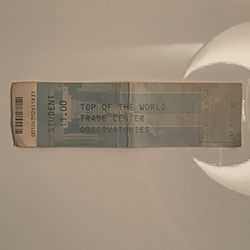
I also remember the incredible sense of solidarity among New Yorkers after 9/11. I mean, I’ve lived in N.Y. my entire life, and I swear to god, I have never seen anyone—let alone folks from New York—be so courteous to one another. The sense of collective trauma really bonded all of us together. Like, I remember in the days following the attack, a family friend who had been volunteering at ground zero showed me these disposable pictures of him with some of the other volunteers with whom he worked alongside--including Joss Whedon and Janeane Garofalo.
There’s a lot I can say about the 9/11 attacks. But ultimately, for me, it was the thing that drove me to study political science at Columbia, attend Community Board 1 meetings in Lower Manhattan, volunteer with Congressman Nadler’s Manhattan district office, and work on projects related to 9/11 relief efforts. Specifically, trying to encourage some of the 400,000 folks who lived, went to school, or spent any amount of time whatsoever in Lower Manhattan in the months following 9/11 to register for the 9/11 Victims Compensation Fund and to get free health monitoring through the WTC Health Program.
So if you were there, please visit: https://www.vcf.gov.
Stuart Gottlieb, GSAS’96, Adjunct Professor of International Affairs and Public Policy
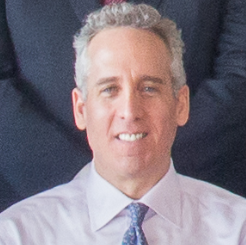
I was on Capitol Hill the morning of Sept. 11, 2001, working as a foreign policy adviser for New York’s senior senator, Charles Schumer. We watched together in stunned silence the live TV images of men and women jumping from the top floors of the World Trade Center as the flames engulfed them; choosing one form of certain death over another.
Recent scenes of carnage and mayhem in Afghanistan, where a full U.S. military withdrawal was immediately followed by a complete Taliban takeover, will likewise be emblazoned in the world’s memory forever. Images of human beings falling from the landing gear of U.S. aircraft lifting off from Kabul airport—choosing one form of certain death over another—cannot be lost to the irony of history.
Incomprehensibly, the Taliban again control Afghanistan. And with them inevitably comes al-Qaeda, ISIS, and Haqqani. It appears that after 20 years, we're back to Sept. 10, 2001.
Thomas Hamilton, CC'60
On 9/11, I left my office at St. John's University to teach my first class of the day, and the departmental secretary came running out of her office where she always had a radio on. She announced an airplane had just hit the World Trade Center.
I stopped and briefly reminisced about the U.S. Army airplane that had hit the Empire State Building when I was six years old. During a visit to see the building, a workman had given me a piece of the airplane as a souvenir. It was very greasy, and my mother soon threw it out.
I continued to Rosati Hall and as I was about to enter, a student came running out yelling a second airplane had hit. I exclaimed "Oh, my God, it's deliberate!"
I taught my introductory astronomy class and returned to my office. Within a few minutes word came that all remaining classes for the day were cancelled and the campus would be closing. I shrugged and started to walk home. A loud boom was followed by a series of lesser booms. The first tower had fallen, and from roughly eight miles away on Grymes Hill in Staten Island we could hear it.
Kenneth Harlin, Access Manager, C.V. Starr East Asian Library
I was at work at the library that morning when one of my staff members called to say he could not get to work because a plane had crashed into the World Trade Center and the subway was not running. I checked the news just as the second plane hit. We had a small black and white Panasonic television in our staff room, and I brought that out to the circulation desk where staff and patrons all gathered to watch. The phones started ringing with relatives and friends calling, including my sister, who lives in D.C., where the Pentagon had also been hit. When the North Tower collapsed, we lost reception but were able to get a clear picture on Spanish-language channel 47. We watched that station and added CBS radio for sound and reports on what was happening.
A decision was made to keep the libraries open so that people would have a place to gather, and the rest of the day was spent around the circulation desk watching scenes of the devastation, listening to reports coming in, worrying about those we knew who worked or lived in that area, and talking with friends and loved ones to share our shock and sadness over what had happened.
Crismon Lewis, GSAS’25
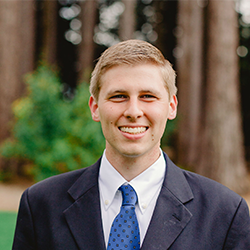
As a 13-year-old getting ready for school one morning, I heard my mother upstairs crying. I went upstairs and saw on television smoke rising from the one World Trade Center tower still standing. As we ate breakfast that morning, I watched the second tower fall on live television and was heart-wrenched to think that hundreds of people lost their lives at that very moment.
9/11 impacted my life as it did for other Americans, but I’ve more keenly felt its significance since moving to NYC, especially since attending the Fireman’s memorial (at 100th and Riverside) and reading the book “The Only Plane in the Sky.”
David Licata, Lead Multimedia Specialist, School of Social Work
I worked on Canal Street and West Broadway at the time. I biked to my job that day, arriving as the towers were on fire. I was told to go home after the first tower fell, which we heard and felt from the office. I left the building and once outside my eyes followed the eye lines of everyone in the crowd. Looking south and up, I could see only one tower standing, but in flames. It didn't take long before I realized that people were on the roof and jumping off. I turned away and headed for home. I walked my bike to the bike path on the West Side because the streets were too crowded to ride. On the way, I saw and heard the second tower fall. On the PATH I rode home, in shock.
I was unsure what to do when I walked into my apartment. Nothing made sense. I turned on CNN, if I was thinking anything, maybe I was thinking they could make sense of this.
Whoever was anchoring that morning announced that they had just received a video clip from a bystander as one of the planes crashed. They aired it. Whoever shot the video was in the middle of some street downtown, near, and possibly part of, a crew that was digging a rut in the street. As the jet flew overhead at such a low altitude, one of the workers, off camera, said, ‘What the f*?!?!’
The clip ended; it was very brief. I continued watching the news. One video after another, from every conceivable angle and during every stage of the event. About 30 minutes later they played the clip shot by the digging crew member. But they had removed the expletive as if that reaction were the horror; as if that were the offense to humanity.
I turned the TV off and stayed away from the news for a very long time.
Pat Lilly, Manager, Visitor Services, Office of the President/The Forum
Pat Lilly, Manager, Visitor Services, Office of the President/The Forum
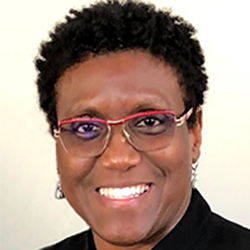
Like many people, I was shaken by the events of 9/11. Every time I heard a loud noise or saw a plane flying above, it rattled me.
I found out later that a family friend lost her life that day.
A few days after the tragedy, I wrote this poem:
TOWERS OF STRENGTH
They’ve destroyed our buildings and so many people
We feel so incomplete, like a church without a steeple
Our hearts will mourn forever and a day
We must overcome this; there’s got to be a way
So let’s come together to grieve with each other
For the loss of our friends, our sisters and brothers
Our Twin Towers are gone, their height and their length
But people united can be Towers of Strength!
Ralf Mekle, SEAS’96, GSAS’03
I was with Biomedical Engineering at Columbia and though based on the main campus I worked most of the time at the Hatch Center of the Radiology Department of Columbia Presbyterian Medical Center. Thus, on 9/11 I was in the shuttle to the medical campus, when the driver told us, "We are being attacked!"
After arriving at the Health Science campus, my colleagues shared the terrible news with me. Web sites and e-mail were down, and most phone lines were not working. Finally, I managed to inform my family that I was safe. From the roof of one of the hospital buildings, we could see the burning towers of the World Trade Center. Everything seemed so unreal!
In the hospital lobby, we saw on TV how the scary events unfolded. We asked whether we could help at the hospital, but during that day it looked as if only a few injured people were taken to Columbia Presbyterian. Worries about friends that worked in the area of the two towers kicked in. Luckily, none of our friends were hurt. Later during the day, I took the shuttle back to the main campus. I met with friends in an attempt to digest the horrific tidings. We all felt sad. It was a "deafening" day.
Ali Naderzad, Staff, East Asian Institute, School of International and Public Affairs
I'd just turned my workstation on when Diane Belleville came out of her office and said: "A plane just hit the World Trade Center. I'm going down to the lobby to watch on the TVs." I threw my bag on my desk and off we went. I figured, a Cessna or some tourist plane, a chopper? A group had gathered in front of the TV screens in the SIPA building lobby. The crash site was in flames. This looked big. Or did it seem big from afar? I couldn't tell.
We watched in disbelief as a second plane hit, the tension in the crowd changed. People started leaving, others were making phone calls, one person was crying. Someone said people were going up to the roof (the SIPA building is the tallest on campus) so I went. And wasn't the sky blue that day? This was a good vantage point. The towers appeared blurry in the distance, they were far from us but you could see a large phosphorous cloud of white above the towers.
I came back down to the lobby TVs and saw the first tower go down. That beautiful WTC lobby with the regal carpeting, those triangular arches, those gleaming towers, stabbing at the sky defiantly, a triumph of man overcoming physics and taking architecture and engineering to the next level. Those Giant Step parties on Wednesdays at Windows of the World. NYC's selfhood was in those towers. They anchored our island, the gates to something bigger than you and me, a promise to many, a mirage to some.
It's only later on, in the news, that I heard, that I saw, the people who were inside the towers, the pixelated guy famously diving, head-first, the cooks in the restaurant, the staff employees, the ones who toiled in the backrooms and the desk jockeys, the bankers, the insurances sales people, the brothers and sons, the daughters-in-law, the wives. The children. Of somebody. Who before they didn't come home, quieted a Thanksgiving day argument, blew the candles on a birthday cake that was too sweet, got a gift card and tucked it away somewhere, for a rainy day, received a promotion or suffered or got encouraged or cheered someone up, who never forgot their first kiss or that entire, memorable day spent under the sheets with that someone they loved. I was stunned. And the phones didn't work. I spoke to my mother, who was crying. The phone lines were jammed, they did not work. I wanted to call someone, but I didn't know who. It didn't matter.
Later on, I heard that my brother, asleep in the West New York apartment that we shared, had slept through the whole thing. That must've been quite the first cup of tea, in front of the news. Later that day, they said the tunnels were all sealed. I got on one of those river taxis to make it to New Jersey and catch a shuttle bus. We left the pier at dusk, about a dozen of us, strangers, everybody quiet. As we got halfway across, a vision of hell appeared as we turned our heads toward it. The southernmost flank of New York City, engulfed in a strange and heavy and dark cloud, as if an army had lost a war and these were the burning embers of defeat. But who was the enemy? And what had we done to deserve this? But wasn't the sky blue that day. #neverforget
Nancy Collins, Chair, Defense and Security Studies
On the twentieth anniversary of 9/11, we honor the heroism of our first responders. These exceptional men and women answered the call, risking their own lives to save our fellow citizens. We will never forget their sacrifice and their amazing generosity of spirit.
Anne Nelson, Research Scholar, School of International and Public Affairs
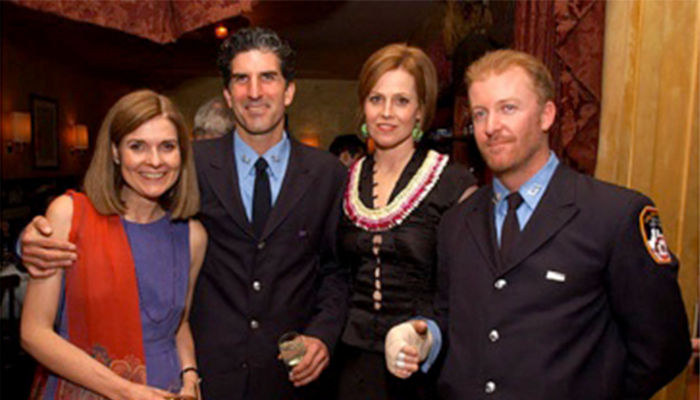
My play, The Guys, was based on an experience I had helping a New York City fire captain write eulogies for the eight men he lost on September 11. I was the director of the international program at the Journalism School at the time. It opened in December 2001, starring Bill Murray and Sigourney Weaver.
It has gone on to be produced every year since then (including as a feature film) in all 50 states and at least 15 countries. There are over 40 productions scheduled [this year], including professional productions in Australia and Japan.
Mary Purcell, Communications Manager, Irving Institute for Clinical and Translational Research/CTSA
I believe my memories and emotions about September 11, are similar to many New Yorkers. What I can't believe is that it's still so painful to remember! Twenty years and it feels like yesterday that "my home" was attacked—it has always felt very personal, a direct violation of my space, my family.
Zaphra Reskakis, CUCP’53
At 8:50 a.m. on September 11, there was an announcement from command post that no buses would be going past Canal Street. We snickered, grumbled, and the consensus was that since this was the New York Mayoral Primary Day, it was probably a demonstration at City Hall.
But, then a woman with a radio said that a plane had flown into the World Trade Center. Passengers said, "Are they blind? Couldn't they see the Twin Towers."
I don't know why, but I blurted out, "I hope it isn't a terrorist attack!"
As we started heading down Broadway to our jobs, some at Wall Street, some at Battery Park and me at the Federal Plaza, where I had just started working the day before, we were mesmerized as we saw a second plane hit and the towers begin to smoke.
I cannot believe, comprehend or understand why we all continued walking toward the burning buildings. As I got to the entrance of my building, I saw people running out into the street. It did not dawn on me that they were evacuating, and I showed my ID to the guard who said: "Lady, we are evacuating the building. Get out of the area."
With that, I turned around to leave and felt the ground rumble and saw the South tower implode. I started walking back, still not believing what I had witnessed.
It was not until Wednesday that I realized that had the tower exploded and fallen eastward, I would have been a statistic instead of a grandma walking for four hours to my apartment in Midtown, with two knees that have metal replacements.
We walked in groups, we hugged, and we cried as we listened to more and more grim news from Washington and rumors that there were four more planes in the area, heading for unknown targets. Suddenly I heard a communal "Oh, my God!" and I turned around and watched as the North Tower imploded. We continued crying and hugging, offering water to each other. I was walking with some people who lived in New Jersey and I did not have to invite them to come home with me, it was understood.
I remember Pearl Harbor, but I was a child then. Now I will never forget September 11. I dream it, see it constantly in my mind's eye, and start crying and alternately shivering as I remember the scene emblazoned in my brain. I cannot understand why I kept walking toward a burning skyscraper that morning.
Ann Louie Salamante, Director for Administration, Office of Alumni and Development
At approximately 8:30 a.m. 20 years ago, my best friend and I were on our way to work commuting through the World Trade Center to take the N train to 1 New York Plaza. On this day, Harry Potter and the Prisoner of Azkaban was also released and I was about to make a pit stop at Borders to purchase the book, but the N train was arriving. My best friend said, "Get it later on our way home instead."
During this time, I was working in the training department at Prudential Financial located in the sub-level of the building and our classes started around 8:30 a.m. Before 9 a.m., students began knocking on my office door asking if they could kindly use my phone. This caught me by surprise and I informed them that we have courtesy phones located down the hall. Their response was that there was a long line and that they needed to get a hold of their family immediately. With that, I allowed the individuals to stay in my office and I walked into one of our classrooms. As I entered, I saw CNN broadcasting a scene so devastating.
I stood next to my colleague, arms crossed on my chest and as we watched, we saw the second plane hit the second building and everyone in the room was speechless. At this point, we all knew that this was not a terrible accident. Our building was immediately under emergency evacuation toward the Brooklyn Bridge where all traffic was being routed. As we waited to determine how we would make it home, we went outside our building and the commotion and smell was even more terrifying than what I saw on screen. It took my best friend and me over 12 hours to get back to Jersey City that day, but we were the lucky ones.
To all of the lives lost, we will never forget. To the brave men and women who sacrificed their life and proudly performed their duties, we are forever grateful and indebted to your services. Let the memory live on! Never forget 9-11!
Ryan Green, SSW’03
I entered the School of Social Work as a graduate student in September 2001. During orientation week in late August, there were various activities for the incoming class, including a cruise around Manhattan. As the boat approached the World Trade Center, I specifically remember making a point to walk to the railing and look up at the Twin Towers as we passed by. At the time, I did not know that this would be the last time I would lay my eyes on these iconic buildings.
About two weeks later, on September 11, I was at my home in New Jersey when I turned on the television and found out what was happening. I was supposed to attend my social work internship that day, and I recall being fearful about making the hour-long drive to the mental health agency where I was working, but I went in nonetheless. The following day, I was scheduled to have class in the city, at the old School of Social Work building on 113th street.
It was oddly surreal taking the train into Manhattan on September 12, but I had resolved to not live in fear and to move forward with living. In hindsight, being a student in the School of Social Work at this time was quite helpful, as much of our class time was dedicated to talking about and processing the events of September 11, and its aftermath. It was an extraordinary time and I appreciate the support provided by the Columbia community.
Pamela Merrill Schwartz, TC’75
I was living in London at the time working for an architecture firm. I had spent ten days in New York visiting my mother in Westchester County and driving to Brooklyn Heights to visit my sister and her family. That Sunday, September 9, we walked down toward the Brooklyn Promenade. Early in the morning on Monday, September 10, I boarded a flight back to London, arriving home around 10 p.m. The following morning, Tuesday, September 11, I stumbled out of bed, jet-lagged, and somehow made my way to work in the West End.
I will never forget receiving a phone call at lunchtime from another American friend, asking me if I heard what happened in NY. In my somewhat foggy, still jet-lagged state I replied, "I just returned from NY last night. What do you mean something happened?" It was then I heard the news about the 2 planes crashing into the twin towers, and their horrific collapse.
As a native New Yorker, it was a very personal thing for me. Horrible to experience from 3,500 miles away, yet so close, as I had just driven through Lower Manhattan 2 days prior. For me, the World Trade Center was a wonderful vibrant symbol of NYC. In paying tribute to my hometown, I managed to get tickets for the 10th commemorative September 11, service held at St. Paul's Cathedral in London.
It was a beautiful moving joint service between St .Paul's Cathedral, London and St. Paul's Chapel on Broadway in NYC. Not only had someone from St Paul's London been visiting St. Paul's NY at the time, but 67 Brits were killed on 9/11. So the audience was made up of American ex-pats, and British families of those killed in the towers. In a corner of Grosvenor Square, former home to the U.S. Embassy, there is a 9/11 memorial garden I used to visit every year on 9/11 as a way of paying homage.
Louis Simons, BUS’68
I was in Rotterdam, Holland, that day visiting my mother. I went to the nearby minimarket to get my Herald Tribune, which arrives there in the afternoon. People in the store were watching TV. I asked what they were watching. They told me an office building in America was burning. I looked up, immediately realized it was a tower in the WTC, left the store (without the Tribune), and turned on the TV in the living room to CNN. My mother asked me what I was watching. I told her. A short while later, when the second building was struck, she asked me to turn the TV off.
Then I realized why she did not want to see the tragedy.
In May 1940, the Germans invaded Holland. On the first day, they dropped paratroopers just outside the city and captured it in short order. Nonetheless, on the last afternoon of the invasion, about the time the Dutch government surrendered, the Luftwaffe sent 180 or so bombers to wipe out the center of Rotterdam, Europe's largest port and Holland's second-largest city. It killed thousands and left some 70,000 homeless. The fires burned for about one week. Our home was about one kilometer from the edge of the devastation. Undoubtedly, my mother thought of that horror and what came afterward.
I tried to find a flight back to my family in the States. Only one airline, SABENA, the Belgian national airline, offered a seat. They were charging more than $6,000 for economy class. I have seldom shouted louder at anyone then at that time. I reminded the Walloon agent that it was the Americans who had liberated that part of Belgium at great cost in human lives (remember the Battle of the Bulge, the costliest loss of life and injured in any U.S. battle of the European/African theatre). She made no apologies for gouging Americans.
I lived in Antwerp after graduating from Columbia. I learned from friends there that SABENA stood for "Some Awful Bloody Experience Never Again.” How right they were.
A week later I flew home to a nation in the same shock as the one my mother had suffered.
Thank you, sincerely, to everyone who shared their thoughtful reflections with us. Hopefully, it will help us remember this day, and continue to grieve, together.
Eileen Barroso, University Photographer
My 9/11 story starts on May 19, 2001 at Columbia’s 247th Commencement Ceremony. As the university photographer, my job is to document events such as telling the story of the day. It is not unusual for me to stay closer to the front of the 40,000 plus attendees at such an event. On May 19, that’s exactly what I did. I captured these young people who were so happy and celebratory after completing a great education at this institution. I can always feel the excitement and joy at this event I try my best to get in there and capture those moments whether they be unique in nature like funny hats or costumes, to students holding their children. Anything that really stands out and captures my attention I will photograph. It also doesn’t hurt your chances to be in the first 20 rows either. This day a group of young men did stand out literally. There were I think four or five college guys over 6ft tall, and they kind of commanded my attention. They were not only very tall, but they had lit cigars in their hands. I must have taken at least 100 or more photos of them during commencement; they were that much fun posing for the camera.
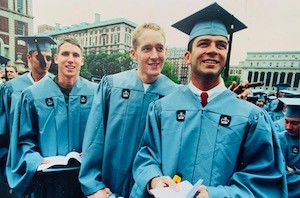
I don’t make the decisions on what gets published in the various magazines but one of my photos of that group of young men with their cigars made it to the Columbia College magazine.
Fast forward to a week after 9/11, and I get a phone call at work from Mr. Victor Ugolyn. He proceeded to tell me that I had taken photos of his son Tyler during commencement back in May and that he had seen it published. He wanted to know if he could get copies of that photo. At first he didn’t come out and say it he just made the request. Mr. Ugolyn proceeded to tell me that his son, Tyler, was killed in the 9/11 attacks on the World Trade Center. I didn’t know what to say. I started to cry, but tried to hold back from him hearing me. I couldn’t believe that now I had some sort of connection to this young life that would literally change me forever.
We ended the call and I told Victor I would get copies made and send them to him and so I did. Back in 2001, I was still shooting film so I needed to locate the negative and get the copies made. I made a few dozen 5x7 photos.
I hung up the phone and just sat in my office and could not believe this young man who made such an impression on me just by his sheer presence was now gone. I would replay over and over in my head what the Ugolyn family must be going through. I had already felt a deepening depression, sadness, and fear from the events of 9/11. Going across the George Washington Bridge everyday from New Jersey to go to work had me on edge for months after the attacks but now I knew a face,Tyler’s face. I never met him before his graduation day, and I had never seen him after, but learning about who he was after he died had left a huge sadness in my heart. For months after his death I continued to send more copies of Tyler’s graduation photos to his mom and dad.
I stayed in touch with Mr. Ugolyn over many years and got to meet him at an awards dinner at Columbia. I did not know he was going to be in attendance, but when I found out I introduced myself and just started crying. I was so overwhelmed to meet him and I just wanted to keep hugging him. That was maybe 10 years after that tragic day. I have kept that photo of Tyler that I took on my desk for the past 20 years; that 5x7 of this young man I never really knew. I honestly can’t believe it’s been 20 years; it always feels like yesterday to me. As far as my job, well all I can say is that my job and my photography is truly the greatest gift I can give anyone. I am truly blessed to do the work I do capturing memories creating history for Columbia through my craft. I’ve never taken it for granted and actually appreciate it even more now that I’m older. Tyler Ugolyn will forever have a special place in my heart and so does his parents and brother. RIP to all who lost loved ones on that very tragic day.
Never Forget.